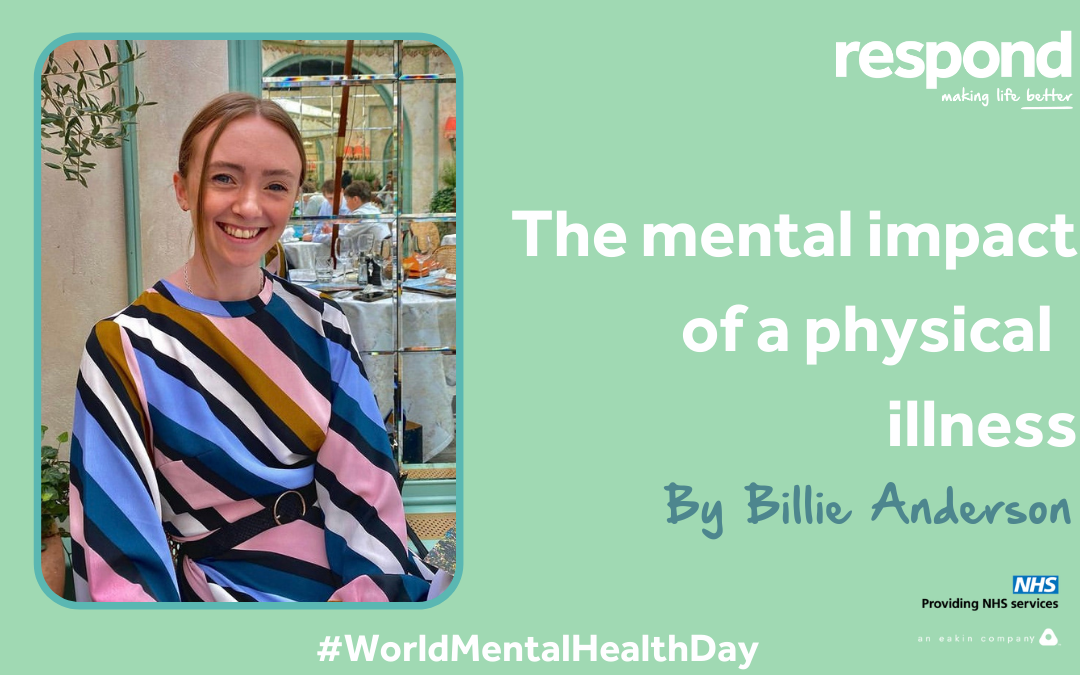Today is World Mental Health Day, an important day to raise awareness and help brake the stigmas associated with mental health. To help raise awareness, this year the lovely Billie has written a blog about her experience with mental health and physical illness, a topic which we’re sure touches home to many of you reading this, and we hope it offers you support and reassurance that you are not alone. Remember, today and everyday, be kind to yourself, and be kind to your mind. 💚
The mental impact of a physical illness
TW: Mental health, anxiety, depression, trauma.
One thing I never counted on was the implications to my mental health with a physical illness.
When I was diagnosed with UC, I’d been flat bound for nearly three months. I wasn’t eating properly, I couldn’t stand on my own and spent most of my time either in bed or on the toilet. I was in constant pain and had no clue what was wrong with me. So, before my pain had a name, I was struggling physically and mentally.
First came the Obsession. I was hell-bent on controlling what I ate and would spend hours going through the internet to look for something I could eat without causing me pain. I whittled my diet down to dry toast and decaf tea. OK it still hurt but not so bad I passed out, like everything else.


Then, there was loneliness and depression. In my colon days, I couldn’t walk more than five feet without needing to sit down, so leaving my flat felt too scary. I would watch the world spin through my phone – every Instagram video or Facebook post just made me sad. Seeing everyone living, while I was surviving upset me and after a while, annoyed me. Not because I was jealous, but because I felt forgotten. The more I struggled to cope with my UC-colon, the more detached from the real world I became. I felt I could relate more to Barry, the 65-year-old retiree with Crohn’s disease who would sit next to me on my infusion day, than I could with healthy people my own age. So I stopped contacting them. I was tired, angry, in pain and upset with my own body and couldn’t talk to someone who didn’t ‘get it‘; so I isolated myself. I didn’t want to read another link to some article titled, ‘think yourself better‘ or hear someone tell me the next drug would work, when I knew it wouldn’t.


Next is the longest standing mental implication of my UC and it’s taken me a long time to see my experience with IBD and surgery as traumatic. The word ‘traumatic’ feels hysterical, but I really did go through trauma. I spent well over a year in constant pain, going from hospital to hospital. I had invasive tests, bad news every time I was faced with my GI and hardly ate anything for years. I became terrified of a normal bodily function. Then there was going through a huge operation and coming out the other side with a stoma.
A lot to handle at 21.
So how have I coped with the mental side effects to a physical condition?
Truth is, I haven’t. Not one bit and I haven’t had the courage to ask my doctors if there is mental health support to deal with all this. Since my operation, the obsession, anxiety and loneliness has subsided. I eat without pain, can go out and see my friends, have a new job and live an incredible life with my stoma! But the trauma is still there. At the moment it’s locked away in a box in my mind somewhere and I can’t bring myself to open it.


That said, never suffer in silence. I did for too long and I regret not reaching out to a professional sooner. My colon was the root cause to a lot of my mental struggles and having that taken out helped a great deal, but for some it’s not the same story. I’ve had incredible support in friends and family, but I realise a professional can help me in ways they can’t.
There will be someone there who wants to listen! 

As long as you know, you’re not alone and you can always reach out to someone close to you or speak to The Samaritans, CCUK Helpline, Mind or your GP.
Thank you to Billie for writing an insightful blog post, we hope you have enjoyed reading and that it has helped you today. For some of our top tips on taking care of yourself and your mind, head to our blog post here.
For more information on our award-winning service, click here or give us a call! If you would like to learn more about our #BeTheChange campaign or get involved click here.

